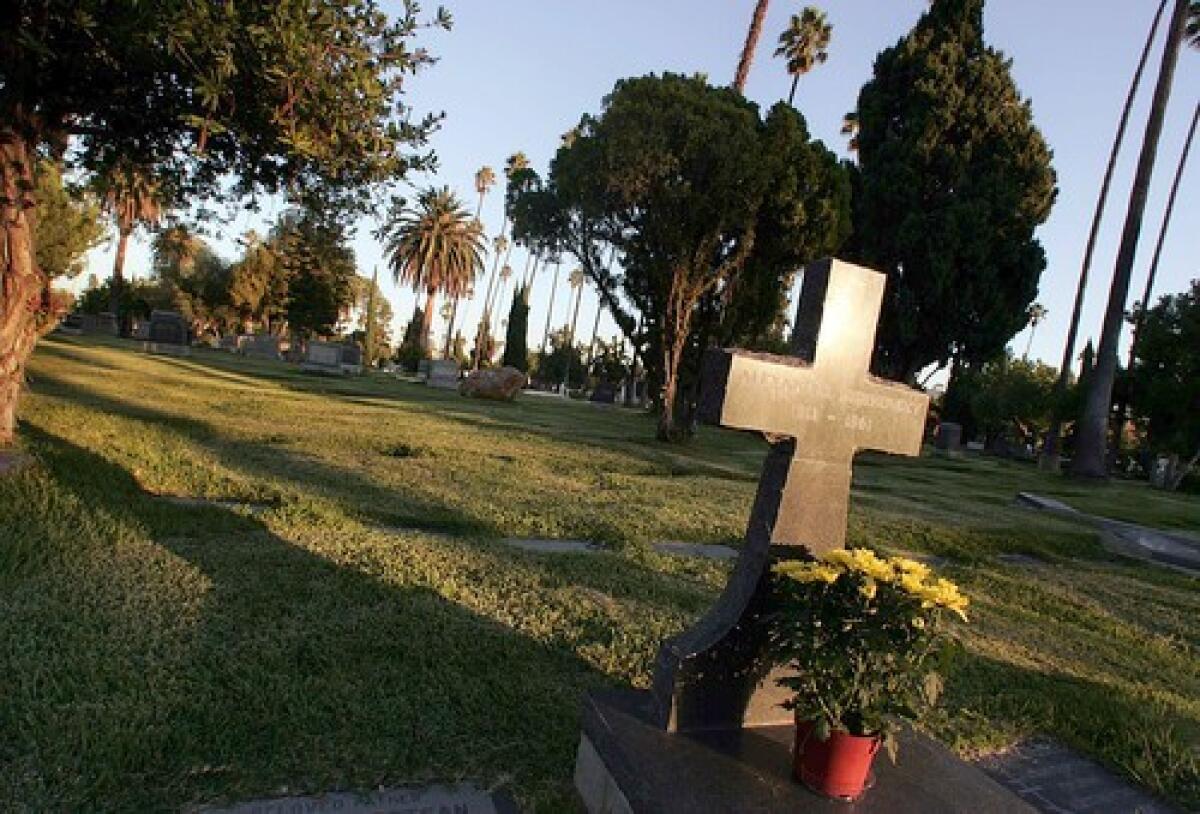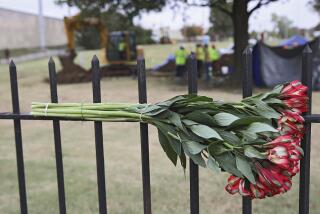Sealing your last deal

You can’t cheat death.
So you might as well face it as a smart shopper.
Planning a funeral used to fall almost entirely to funeral homes, which guided bereaved loved ones into standardized deals that might have included services or items the dearly departed might not have chosen. But federal and state laws have put the power of choice into the hands of consumers, and more and more people are taking advantage of it by planning their own send-offs, thereby controlling the cost.
A poll conducted by Harris Interactive in 2005 found that 47% of people said they were going to plan their own funerals. And businesses -- factory-direct emporiums, online merchants and even Costco -- have responded with products to meet the need.
It’s not difficult, according to consumer advocates, to design a funeral that can cost a good deal less than the national average of about $6,500. You can even go green with an environmentally friendly exit strategy.
So if you choose to go death shopping, the place to start is with your rights under the law.
The Funeral Rule
The bedrock federal consumer law on death matters went into effect in 1984. It’s known throughout the industry as the “Funeral Rule.”
The law has strong provisions that govern how funeral providers have to deal with consumers:
* If you call a funeral home and ask about prices, the staff has to give them to you, even if you don’t disclose your name or telephone number.
* If you visit a funeral home and ask about prices, they must give you a detailed, printed document known as the “general price list.” And you can take it home.
* You have the right to buy some items, such as caskets, from outside providers. The funeral home can’t add a corkage-type fee when you BYOB (bring your own box).
* Caskets are not required for cremations. A provider who offers cremations must make alternative boxes available.
* Before you buy, all the goods and services you’ve chosen must be detailed in a written statement that shows the cost of each item. If an item is required because of a law or cemetery requirement, that must be noted.
Now that you know the rules, it’s times to plan.
Death wishes
If there’s one thing the funeral establishment and consumer advocates can agree upon, it’s the value of making a plan that takes into account both your wishes and financial realities.
“It allows a person to make decisions at a time when emotions are not raw,” said Shaun Meyers, a funeral director in Ogden, Utah, and a member of the National Funeral Directors Assn. executive board.
Joshua Slocum, executive director of the Funeral Consumers Alliance watchdog group, advised visiting or at least calling several funeral homes to compare. Be wary, he said, of package deals that include the casket, service, flowers and other items.
“They might say something like, ‘This is our traditional package,’ ” Slocum said. “Every time you see that word ‘traditional,’ cross it out and replace it with ‘most profitable.’ ”
He suggests making your choices a la carte so you can forgo items often included in packages.
For example, no federal or state laws require embalming of a body before burial, although many funeral homes won’t allow a viewing without it. Skipping embalming and viewing can save about $800, according to average prices determined in a 2005 National Funeral Directors survey.
But you have to act quickly. If you don’t embalm, California law says a funeral home must refrigerate the body after 24 hours, and that can cost about $50 a day.
That’s money in your afterlife pocket, or you can put it toward other items. Hollywood Forever Funeral Home, located on the grounds of the cemetery of the same name, has some of the most flamboyant offerings.
On the high end of items in its 32-page price list is the production of a documentary film on a customer’s life, complete with red carpet premiere. The price for the film starts at $30,000.
On the other end of the cost scale: printed funeral programs at $3.50 each.
Die now, pay later?
The funeral industry pushes prepaid plans that take care of major costs in advance.
Consumer advocates loathe them.
“Planning ahead is wonderful,” Slocum said. “Paying for it is usually a mistake.”
About a third of the complaint calls that come into the Funeral Consumers Alliance concern prepaid plans, mostly having to do with unexpected aspects of the deals. Examples include consumers who couldn’t transfer a plan when moving or couldn’t convert it from burial to cremation.
Meyers says the best prepaid plans are funded through insurance policies because they’re generally flexible. And they often guarantee, after a couple of years of installment payments, that all the services in the contract will be delivered even if all the payments haven’t been made at the time of death.
“With this plan,” he said, “fewer decisions have to be made by loved ones when the time comes.”
But insurance-based plans are usually the most expensive.
Instead, Slocum recommends that consumers set up a payable-upon-death bank account, also known as a Totten trust. It’s a fund paid upon death to a designated beneficiary, outside of probate, to cover funeral expenses.
It’s highly flexible in that it can travel and even be drawn upon if you suddenly need some money while alive.
The box
California law doesn’t require a casket for burial, although most cemeteries do (plus, in many cases, a vault to keep the box from sinking).
If you ask to see the caskets for sale at a funeral home, the business is required to give you a price list of all they have to offer. That way, you can ask about caskets that might not be on display.
Many funeral homes offer an “alternative container.” That’s industry code for a simple box, sometimes made of humble cardboard. Meyers said he had sold only one for burial in his 27 years in the business. The price was $75.
You can also get a casket from a factory-direct shop, membership stores such as Costco or even on the Internet. It’s unlikely they’ll carry the exact same models, so a direct price comparison probably won’t be possible. But you can get an idea of what you want.
Most third-party casket providers, including Costco, have the ability to deliver their products quickly, sometimes by the next day.
Of caskets in general use, the cheapest are usually made of cloth-covered, inexpensive wood. At ABC Caskets, which sells to the public from its East Los Angeles factory, those start at $356.
Metal caskets, which are the most popular now, generally go for about $1,000 at ABC. The most expensive are solid wood, which can run about $6,000.
You can pay a lot more. At Forest Lawn Memorial-Parks & Mortuaries, which has several locations, the most expensive casket is an all-mahogany model that costs $20,000.
Cremation is usually less expensive than burial on several fronts. It does require a combustible box, which can be of the “alternative-container” variety. Forest Lawn has one for $39.
But urns, for keeping the ashes, can get elaborate. Forest Lawn has one adorned with brass dolphins for $1,400.
There’s also a specialty market in urns. Eternal Image Inc. has announced it would be selling urns in the colors and logos of major league baseball teams. You can honor the Dodgers’ deadly season.
The plot cheapens
Where do you go when you want a bargain in life? Craigslist, the Recycler, Pennysaver, right?
You can go there in death too. Each of those classified services regularly has burial plots for sale.
Just last week, the Craigslist for Los Angeles listed 13 plots. Lowest in price was a plot at Valhalla Memorial Park in North Hollywood, for $1,950 (maybe it’s near comedian Oliver Hardy or wrestler Gorgeous George).The most expensive listing was a single plot in Hillside Memorial Park in Los Angeles for $20,000, billed as “next to Al Jolson Memorial.”
Even EBay gets in on the act. Last week there was a plot at Mount Sinai Memorial Park in the Hollywood Hills up for auction. Starting bid: $5,000.
One of the main reasons plots are resold is that people move to a different city. Or they get divorced and don’t favor the idea of eternal rest next to an ex. And sometimes, death planning takes a back seat to the sudden need for living expenses.
Death at home
For the ultimate do-it-yourselfer, you can plan to have a funeral in the comfort of your home. There’s nothing in federal or state laws that requires use of a mortuary or any type of funeral professionals.
But several steps must be taken to prepare for burial or cremation, according to the California Cemetery and Funeral Bureau.
Proper paperwork, including a certificate of death, has to be filed with the local registrar of births and deaths. A casket or combustible cremation container must be provided. And arrangements must be made with a cemetery or crematory.
No embalming or refrigeration is required for a body to be kept at home. But take heed of this warning from the state bureau’s consumer manual: “Generally, decomposition will proceed more rapidly without refrigeration or embalming.”
Not a good option for procrastinators.







